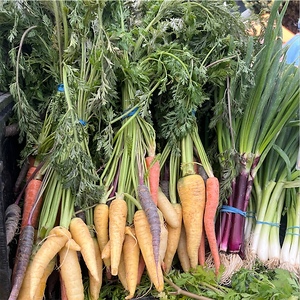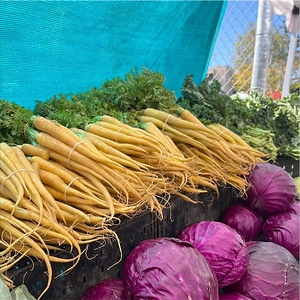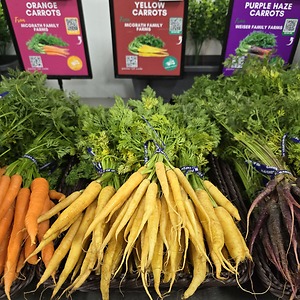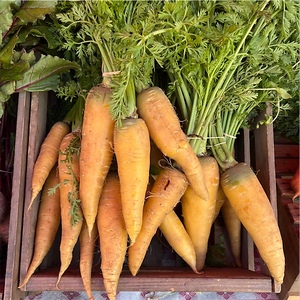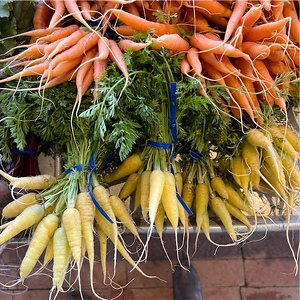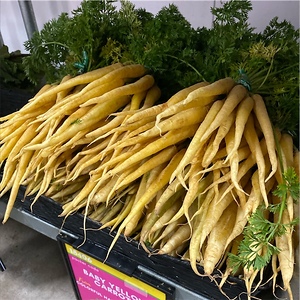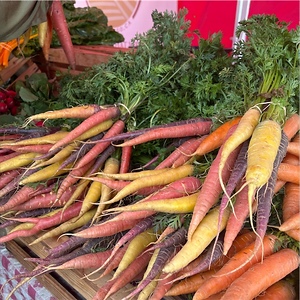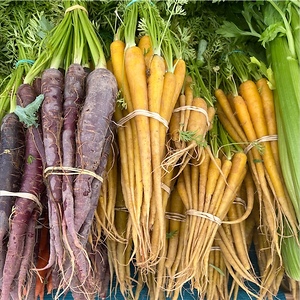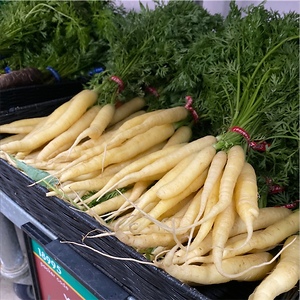


Baby Yellow Bunched Carrots
Estimated Inventory, 24 ct : 9.00
This item was last sold on : 06/30/25
Description/Taste
Baby Yellow carrots are small in size, averaging 10-12 centimeters in length, and are conical and slender in shape, slightly tapering towards the non-stem end. The skin is smooth, firm, pale yellow to gold, and is lightly covered in fine root hairs. Underneath the surface, the flesh is dense, crisp, and yellow with a snap-like quality. When raw, Baby Yellow carrots are crunchy and mildly sweet without the earthiness commonly associated with other carrot varieties. When cooked, the flesh softens to develop a tender texture with a rich, sweet taste. The tops of Baby Yellow carrots are also edible, displaying grassy and earthy-sweet flavors with matching aromatics.
Seasons/Availability
Baby Yellow carrots are available year-round.
Current Facts
Baby Yellow carrots, botanically classified as Daucus carota subs. Sativus, are edible, underground roots that belong to the Apiaceae family along with parsnips, celery, and parsley. Baby Yellow carrots are regular yellow varieties that are harvested at an immature state, and there are also a few varieties developed intentionally for the baby carrot market. Baby Yellow carrots are typically sold in bunches at specialty grocers and farmer markets and are favored by consumers for their sweet taste and light crunch, utilized in savory applications.
Nutritional Value
Baby Yellow carrots contain vitamin A, potassium, vitamin B6, and some biotin. They also contain lutein, which is the yellow pigment found in the flesh that can help prevent macular degeneration and protect the overall health of the eyes.
Applications
Baby Yellow carrots are best suited for both raw and cooked applications such as sautéing, glazing, boiling, and roasting. The small roots can be utilized fresh, sliced and tossed into green salads, coleslaws, and grain bowls, pureed into sauces, or pickled for extended use as a condiment. Baby Yellow carrots can also be cooked in soups, stews, stocks, braised with cooked meats, mixed with celery and onions to make a mirepoix, or glazed with sugar and butter as a caramelized side dish. Baby Yellow carrots pair well with herbs such as parsley, tarragon, rosemary, basil, chervil, and coriander, meats such as poultry, beef, and pork, nuts such as pistachios and almonds, leeks, and potatoes. The roots will keep up to one month when stored loosely placed in a plastic bag with good air circulation in the crisper drawer of the refrigerator. Never store fruit along with carrots, as fruits expel ethylene gas that is readily absorbed by carrots. The carrots exposed to the ethylene gas will turn very bitter, making them not suitable for eating.
Ethnic/Cultural Info
California produces over eighty-seven percent of the carrots grown in the United States, and the roots can be cultivated multiple times per year due to the state’s mild and favorable climate. There is even an annual carrot festival held in February in Holtville, California that has been celebrating the root for over seventy-two years. During the week-long celebration, there is live music, food vendors, award ceremonies, and a carrot racing competition. Throughout the event, carrots are also sold fresh by the bunches, and Baby Yellow carrots are sometimes bundled in colored carrot bunches along with purple, red, and white varieties.
Geography/History
Yellow carrots originated over five thousand years ago in present-day Afghanistan in Central Asia. As the roots were domesticated, natural hybrids and mutants were developed and crossed with wild and cultivated varieties creating new cultivars varying in color, size, and flavor. Yellow carrots were then transported via seeds across Africa, Europe, and Eastern Asia and were sold during trade expeditions. Baby Yellow carrots have been around since ancient times but were not marketed commercially until the 20th century. Today Baby Yellow carrots can be found at local farmers markets, specialty grocers, and in home gardens in North America, South America, Africa, Europe, Asia, and Australia.
Featured Restaurants
Restaurants currently purchasing this product as an ingredient for their menu.
| Kitchens for Good - Culinary Program | San Diego CA | 619-450-4040 |
| Huntress | San Diego CA | 619-955-5750 |
| Little Frenchie | Coronado CA | 619-522-6890 |
| Georges at the Cove | San Diego CA | 858-454-4244 |
| Slowly | San Diego CA | 858-352-6080 |
| The Plot | Oceanside CA | 422-266-8200 |
| Chateau La Jolla | San Diego CA | 858-459-4451 |
| LANA | Solana Beach CA | 602-758-2596 |
| InterContinental Vistal Kitchen | San Diego CA | 619-501-9400 |
| Kettner Exchange | San Diego CA | 909-915-9877 |
| Harvest Kitchen | Vista CA | 619-709-0938 |
| Cloak and Petal | San Diego CA | 626-319-6878 |
| Sheraton Carlsbad (20/20) | Carlsbad CA | 760-827-2400 |
| Toast Catering | San Diego CA | 619-795-9135 |
| Pacific Yacht Agents | Los Angeles CA | 808-214-0970 |
| US Grant Hotel Grill | San Diego CA | 619-232-3121 |
| Eddie V's La Jolla - EV# 8511 | La Jolla CA | 858-459-5500 |
| Mission Bay Beach Club | San Diego CA | 858-201-7551 |
| C 2 C | San Diego CA | 619-972-9345 |
| Carte Hotel | San Diego CA | 619-365-1858 |
| Hilton Garden Inn | San Diego CA | 858-720-9500 |
| Bridges at Rancho Santa Fe | Rancho Santa Fe CA | 858-759-6063 |
| Mille Fleurs | Rancho Santa Fe CA | 858-756-3085 |
| InterContinental San Diego | San Diego CA | 619-501-9400 |
| Starlite Kitchen | San Diego CA | 619-358-9766 |
| Kingfisher | San Diego CA | 619-861-8074 |
| Harney Sushi Oceanside | Oceanside CA | 760-967-1820 |
| Stake Chophouse & Bar | Coronado CA | 619-522-0077 |
Recipe Ideas
Recipes that include Baby Yellow Bunched Carrots. One
| La Cucina Italiana |
|
Yellow Carrot Fritters |
| Ricardo |
|
Cream of Yellow Carrot, Leek, and Saffron Soup |



